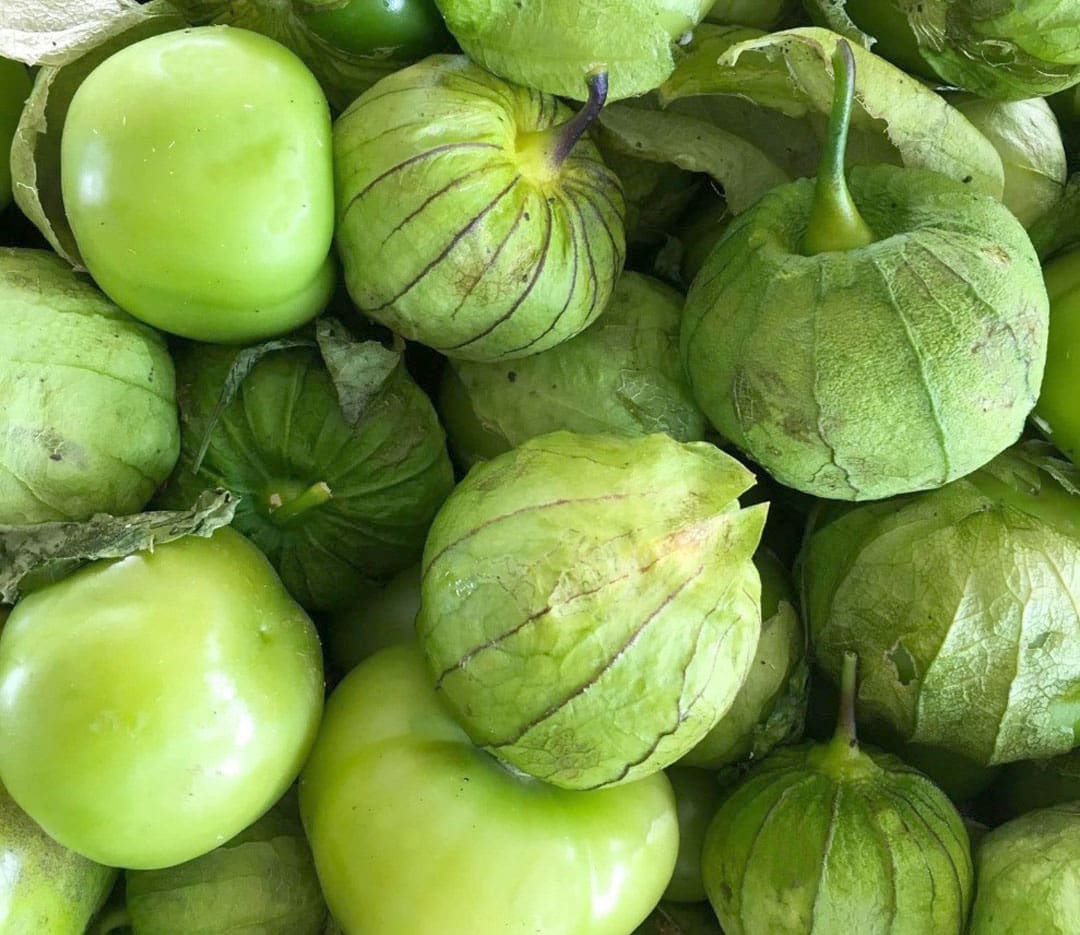For individuals looking to add other fruits and vegetables to their diet, can adding tomatillos provide variety and nutrition?

Table of Contents
Tomatillo
Tomatillos are a fruit that can bring a bright citrus flavor to various dishes.
Nutrition
The U.S. Department of Agriculture provides the following information for one medium/34g tomatillo. (FoodData Central. U.S. Department of Agriculture. 2018)
- Calories – 11
- Carbohydrates – 2 grams
- Fat – 0.3 grams
- Protein – 0.3 grams
- Fiber – 0.7 grams
- Sodium – 0.3 milligrams
- Sugars – 1.3 grams
Carbohydrates
- Tomatillos are low in carbohydrates, with just 2 grams per medium fruit. (FoodData Central. U.S. Department of Agriculture. 2018)
- Of this, 0.7 grams come from fiber, and 1.3 grams are natural sugars.
Fats
- Tomatillos contain less than half a gram in one medium-sized tomatillo.
Protein
- There is less than half a gram of protein per tomatillo.
Vitamins and Minerals
Tomatillos provide:
- Vitamin A
- Vitamin C
- Potassium
- And provide several other micronutrients in smaller doses.
Benefits
Tomatillo’s health benefits include the following.
Cardiovascular Health
Tomatillos provide a heart-healthy dietary addition. They are naturally low in sodium and rich in potassium, which could help regulate blood pressure. They provide vitamins A and C and antioxidants against free radicals.
The American Heart Association recommends the consumption of a variety of fruits and vegetables daily for various benefits. One of them is their fiber content. Fiber is the indigestible part of carbohydrates that can help decrease cholesterol by binding and removing cholesterol from the body. Tomatillos contain about one gram of fiber, a recommended addition to a heart-healthy diet. (American Heart Association. 2023)
Potentially Help Reduce Cancer Risk
Tomatillos have several antioxidants with cancer-preventing properties. They are a source of phytochemicals known as withanolides. These natural plant compounds have been shown to induce apoptosis/cell death in colon cancer cells. (Peter T. White et al., 2016) Diets high in fruits and vegetables have been associated with lower risks of cancer, making tomatillos a welcome addition to a high-antioxidant nutrition plan focused on cancer prevention.
Arthritis Symptoms Improvement
The withanolide antioxidants are also anti-inflammatory. Research on withanolides demonstrates clinical benefits in the alleviation of symptoms of osteoarthritis and rheumatoid arthritis. (Peter T. White et al., 2016) Tomatillos may help reduce inflammation, which can make arthritis more manageable.
Vision Loss Prevention
Tomatillos provide a healthy source of key nutrients for eye health. Lutein and zeaxanthin are antioxidants that concentrate in the retina and help protect against environmental deterioration. Tomatillos provide:
- Beta carotene
- Vitamin E
- Vitamin C
- Copper
- Zinc
- In combination, these vitamins have shown the ability to slow the progression of age-related macular degeneration, a common cause of vision loss. (National Institutes of Health, Office of Dietary Supplements. 2023)
Weight Loss
Tomatillos are a low-calorie whole food ingredient. Because of their high water content, it’s possible to fill up without adding excess calories. Fresh salsa made with tomatoes or tomatillos is a healthy, flavorful choice that is virtually free of added sugars. (The National Kidney Foundation. 2014)
Adverse Effects
Tomatillos are part of the nightshade family. While there is no conclusive evidence confirming any harmful effects, some individuals report experiencing sensitivity to them. (Cleveland Clinic. 2019) Individuals who believe they may be sensitive to tomatillos should consult a registered dietitian to determine the root cause and ways to improve tolerance.
Allergies
- Although rare, serious reactions, including anaphylaxis, are possible even if the individual shows no signs of a tomato allergy.
- Individuals unsure about an allergy to tomatillos should see an allergist for testing.
Varieties
- Different varieties include yellow, green, and purple. (MacKenzie J. 2018)
- Rendidora is a green variety that grows upright with a high yield.
- Gulliver Hybrid, Tamayo, Gigante, and Toma Verde are also green but grow in a sprawling pattern.
- Some purple varieties include Purple Hybrid, De Milpa, and Coban. (Drost D, Pedersen K. 2020)
Choosing
- Choose tomatillos that are firm and green but large enough that they fill up the husks.
- When they ripen too long, their flavor becomes bland. (MacKenzie J. 2018)
Storage and Safety
- Tomatillos can last months in their husks, spread out in a well-ventilated area. (MacKenzie J. 2018)
- Keep them in a paper bag in the refrigerator for no longer than 2 weeks if using sooner.
- Do not store in plastic, as this can cause spoilage.
- For extended storage, tomatillos may be frozen or canned.
- Remove the husks, wash them, and dry them before eating or preparing them for long-term storage.
Preparation
Tomatillos have a distinct flavor and firm texture. They can be eaten whole with no need to seed or core them. (Drost D, Pedersen K. 2020) Use tomatillos for:
- Raw
- Salsa verde
- As a topping
- Sandwiches
- Salads
- Soups
- Stews
- Fried
- Broiled
- Roasted for a side dish
- Added to smoothies
The Healing Diet: Combat Inflammation, Embrace Wellness
References
FoodData Central. U.S. Department of Agriculture. (2018). Tomatillos, raw. Retrieved from https://fdc.nal.usda.gov/fdc-app.html#/food-details/168566/nutrients
American Heart Association. (2023). How to Eat More Fruit and Vegetables (Healthy Living, Issue. https://www.heart.org/en/healthy-living/healthy-eating/add-color/how-to-eat-more-fruits-and-vegetables
White, P. T., Subramanian, C., Motiwala, H. F., & Cohen, M. S. (2016). Natural Withanolides in the Treatment of Chronic Diseases. Advances in experimental medicine and biology, 928, 329–373. https://doi.org/10.1007/978-3-319-41334-1_14
National Institutes of Health, Office of Dietary Supplements. (2023). Vitamin A: Fact Sheet for Health Professionals. Retrieved from https://ods.od.nih.gov/factsheets/VitaminA-HealthProfessional/
The National Kidney Foundation. (2014). 6 of the Best and Worst Condiments for Health (Kidney Basics, Issue. https://www.kidney.org/news/ekidney/july14/7_Best_and_Worst_Condiments_for_Health
Cleveland Clinic. (2019). What’s the Deal With Nightshade Vegetables? (healthessentials, Issue. https://health.clevelandclinic.org/whats-the-deal-with-nightshade-vegetables/
Jill, M. (2018). Growing Tomatillos and Ground Cherries in Home Gardens. https://extension.umn.edu/vegetables/growing-tomatillos-and-ground-cherries#harvest-and-storage-570315
Drost D, P. K. (2020). Tomatillos in the Garden (Horticulture, Issue. https://digitalcommons.usu.edu/cgi/viewcontent.cgi?article=2658&context=extension_curall
Post Disclaimer
Professional Scope of Practice *
The information on this blog site is not intended to replace a one-on-one relationship with a qualified healthcare professional or licensed physician and is not medical advice. We encourage you to make healthcare decisions based on your research and partnership with a qualified healthcare professional.
Blog Information & Scope Discussions
Welcome to El Paso's Premier Wellness and Injury Care Clinic & Wellness Blog, where Dr. Alex Jimenez, DC, FNP-C, a board-certified Family Practice Nurse Practitioner (FNP-BC) and Chiropractor (DC), presents insights on how our team is dedicated to holistic healing and personalized care. Our practice aligns with evidence-based treatment protocols inspired by integrative medicine principles, similar to those found on this site and our family practice-based chiromed.com site, focusing on restoring health naturally for patients of all ages.
Our areas of chiropractic practice include Wellness & Nutrition, Chronic Pain, Personal Injury, Auto Accident Care, Work Injuries, Back Injury, Low Back Pain, Neck Pain, Migraine Headaches, Sports Injuries, Severe Sciatica, Scoliosis, Complex Herniated Discs, Fibromyalgia, Chronic Pain, Complex Injuries, Stress Management, Functional Medicine Treatments, and in-scope care protocols.
Our information scope is limited to chiropractic, musculoskeletal, physical medicine, wellness, contributing etiological viscerosomatic disturbances within clinical presentations, associated somato-visceral reflex clinical dynamics, subluxation complexes, sensitive health issues, and functional medicine articles, topics, and discussions.
We provide and present clinical collaboration with specialists from various disciplines. Each specialist is governed by their professional scope of practice and their jurisdiction of licensure. We use functional health & wellness protocols to treat and support care for the injuries or disorders of the musculoskeletal system.
Our videos, posts, topics, subjects, and insights cover clinical matters and issues that relate to and directly or indirectly support our clinical scope of practice.*
Our office has made a reasonable effort to provide supportive citations and has identified relevant research studies that support our posts. We provide copies of supporting research studies available to regulatory boards and the public upon request.
We understand that we cover matters that require an additional explanation of how they may assist in a particular care plan or treatment protocol; therefore, to discuss the subject matter above further, please feel free to ask Dr. Alex Jimenez, DC, APRN, FNP-BC, or contact us at 915-850-0900.
We are here to help you and your family.
Blessings
Dr. Alex Jimenez DC, MSACP, APRN, FNP-BC*, CCST, IFMCP, CFMP, ATN
email: coach@elpasofunctionalmedicine.com
Licensed as a Doctor of Chiropractic (DC) in Texas & New Mexico*
Texas DC License # TX5807
New Mexico DC License # NM-DC2182
Licensed as a Registered Nurse (RN*) in Texas & Multistate
Texas RN License # 1191402
ANCC FNP-BC: Board Certified Nurse Practitioner*
Compact Status: Multi-State License: Authorized to Practice in 40 States*
Graduate with Honors: ICHS: MSN-FNP (Family Nurse Practitioner Program)
Degree Granted. Master's in Family Practice MSN Diploma (Cum Laude)
Dr. Alex Jimenez, DC, APRN, FNP-BC*, CFMP, IFMCP, ATN, CCST
My Digital Business Card


